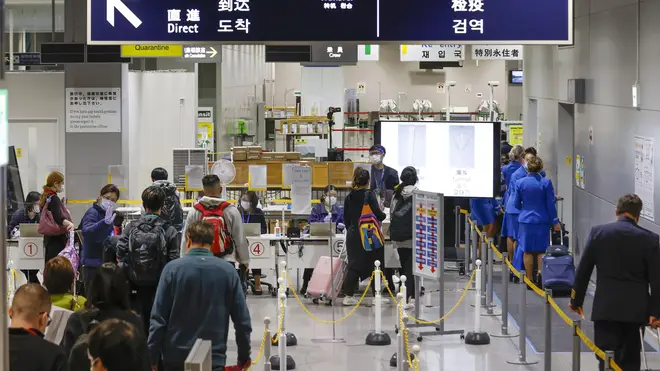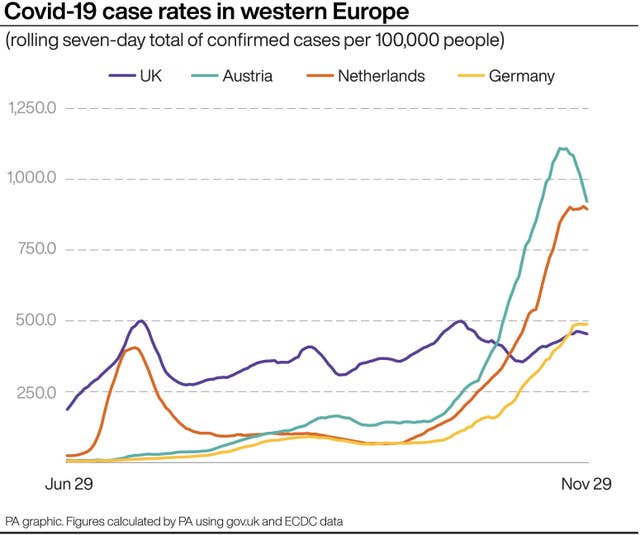
Ben Kentish 10pm - 1am
30 November 2021, 12:34

Dutch authorities discovered the new variant in samples dating back to November 19 and 23 – pre-dating the first identified cases in southern Africa.
The Omicron variant of the coronavirus was already in the Netherlands when South Africa alerted the World Health Organisation (WHO) about it last week, Dutch health authorities have said.
The announcement adds to fear and confusion over the new version of the coronavirus in a world hoping it had left the worst of the pandemic behind.
The RIVM health institute said it found Omicron in samples dating from November 19 and 23.

Those findings pre-date the positive cases found among passengers who came from South Africa last Friday and were tested at Amsterdam’s Schiphol airport. The WHO said South Africa first reported the Omicron variant to the UN agency on November 24.
It remains unclear where or when the variant first emerged – but that has not stopped wary nations from rushing to impose travel restrictions, especially on visitors coming from southern Africa.
Those moves have been criticised by South Africa and the WHO has urged against them, noting their limited effect.
Muchas gracias #Chile Health Minister @DrEnriqueParis for your leadership on a #PandemicTreaty /accord at the #WHASpecial . We welcome your support, including for strengthening and sustainable financing of @WHO . We also discussed 🇨🇱's effective management of the #COVID19 response pic.twitter.com/0SGpdrqUTl
— Tedros Adhanom Ghebreyesus (@DrTedros) November 29, 2021
Japan and France also confirmed their first cases of the new variant on Tuesday as countries around the world scrambled to close their doors or find ways to limit its spread while scientists study how damaging it might be.
The WHO has warned that the global risk from the Omicron variant is “very high” based on early evidence, saying it could lead to surges with “severe consequences”.
French authorities confirmed the first case of the Omicron variant in the French island territory of Reunion in the Indian Ocean.
Patrick Mavingui, a microbiologist at the island’s research clinic for infectious diseases, said the person who has tested positive for the new variant is a 53-year-old man who had travelled to Mozambique and stopped in South Africa before returning to Reunion.
The man was placed in quarantine. He has “muscle pain and fatigue”, Mr Mavingui said, according to public television station Reunion 1ere.
A day after banning all foreign visitors as an emergency precaution against the variant, Japan confirmed its first case on Tuesday, in a visitor who had travelled from Namibia.
A government spokesperson said the patient, a man in his 30s, tested positive upon arrival at Narita airport on Sunday and was isolated. He is being treated in hospital.

Cambodia barred entry to travellers from 10 African countries, citing the threat from the Omicron variant. The move came just two weeks after Cambodia reopened its borders to fully vaccinated travellers.
The new version was first identified days ago by researchers in South Africa, but the Dutch case and similar ones suggest that it had been circulating for a number of days before that.
Authorities in the eastern German city of Leipzig said on Tuesday they had confirmed an infection with the Omicron variant in a 39-year-old man who had neither been abroad nor had contact with anyone who had been, news agency dpa reported.
Leipzig is in the eastern state of Saxony, which currently has Germany’s highest overall coronavirus infection rates.

The WHO said there are “considerable uncertainties” about the Omicron variant. But it said preliminary evidence raises the possibility that the variant has mutations that could help it both evade an immune-system response and boost its ability to spread from person to person.
The WHO stressed that while scientists are seeking evidence to better understand this variant, countries should accelerate vaccinations as quickly as possible.
Despite the global worry, doctors in South Africa are reporting patients are suffering mostly mild symptoms so far. But they warn that observations of the variant are at an early stage.
Also, most of the new cases are in people in their 20s and 30s, who generally do not get as sick from Covid-19 as older patients.